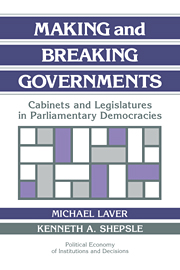5 - Strong parties
Published online by Cambridge University Press: 06 January 2010
Summary
One of the key conclusions of the previous chapter – and indeed of our entire analysis – had to do with the role of strong parties in the making and breaking of governments. In a nutshell, if a party is very strong, then the cabinet giving that party all portfolios is preferred by some legislative majority to any alternative cabinet. A party may also be merely strong, however, if it participates in every cabinet that is preferred by a legislative majority to the cabinet in which it controls all portfolios. In the previous chapter we show that there can be at most one strong party. Our central result, stated in Proposition 4.2, is that a strong party can dominate the business of government formation and guarantee itself a place at the cabinet table. This result has fundamental implications, both for the analysis of particular cases and for our general understanding of the making and breaking of governments in parliamentary democracies.
If we want to analyze a particular government formation situation using our model, one of the first things we need to know is which party (if any) is the strong party. If we want to understand the process of government formation more generally, then we need to know about the conditions under which a configuration of legislative parties generates a strong party. Thus in this chapter we take a closer look at strong parties and the party configurations that sustain them.
We do this in several ways. First, we briefly discuss how to squeeze as much juice as we can out of our model by focusing on necessary and sufficient conditions for the existence of a strong party.
- Type
- Chapter
- Information
- Making and Breaking GovernmentsCabinets and Legislatures in Parliamentary Democracies, pp. 90 - 122Publisher: Cambridge University PressPrint publication year: 1996
- 1
- Cited by



